PrivilAGE
'Us versus them' mentality and the influence of generational labels on ageism.

Generational Labels, Generational Divide and Ageism
Did you know that there existed a generation when smoking inflight was allowed? Or that your essays once had to be typed by using a historical artefact called a typewriter?
Generations have evolved. Millennials[1981-1996] today would be proud of the fact that we’ve inched towards socially practising that work-life matters more than anything and on the other hand, GenZ ers [1997-2012] would probably be in a dilemma between our need to hustle or prioritise self-care.
With changes over the years combined with our growing familiarity of these labels, research has shown that there exists a generational divide based on superficial labels that were introduced to understand human characteristics over the span of 20 years (which is a very long period of time during which a LOT can take place)
From a very broad and expansive view of each generation, it’s safe to say there will be shared experiences, similar behavioural patterns, work ethics etc. But, can we really use those labels and characteristics to generalise and stereotype each person born within a birth year cohort?
Caitlin Crommett, the founder of Generation What Academy which aims to change the stereotypical narratives associated with generational labels, shares her experience of dealing with ageism in her place of work.
“I specifically had an experience in college where I was talking about DreamCatchers (her non-profit organisation) with a staff member who was much older than me and he actually called me a toddler in a sandbox when he was insulting me.
“This is so generationally driven where he thinks he's so much better than me because he's older and it felt like a real example of how harmful this can be.
“I've heard countless times from my peers and all generations, that they've experienced some sort of stereotyping or ageism in the workplace. And all of this can be solved with just simple understanding and simple conversations.”
Generation What? Academy- Explaining stereotypes in 2 minutes
Video Credit: Generation What Academy
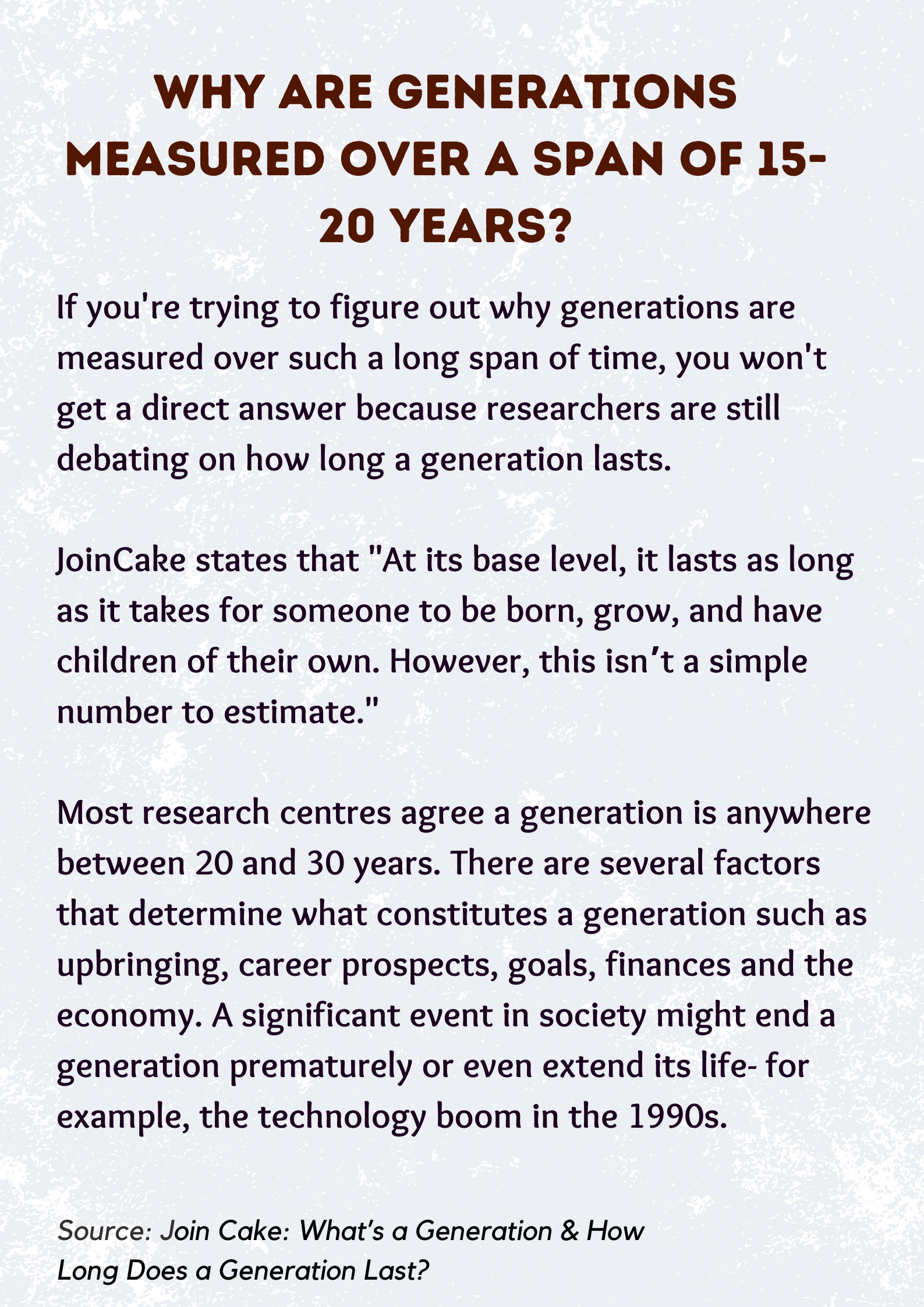

Caitlin Crommett: Founder of DreamCatchers Foundation and Generation What Academy
Caitlin Crommett: Founder of DreamCatchers Foundation and Generation What Academy
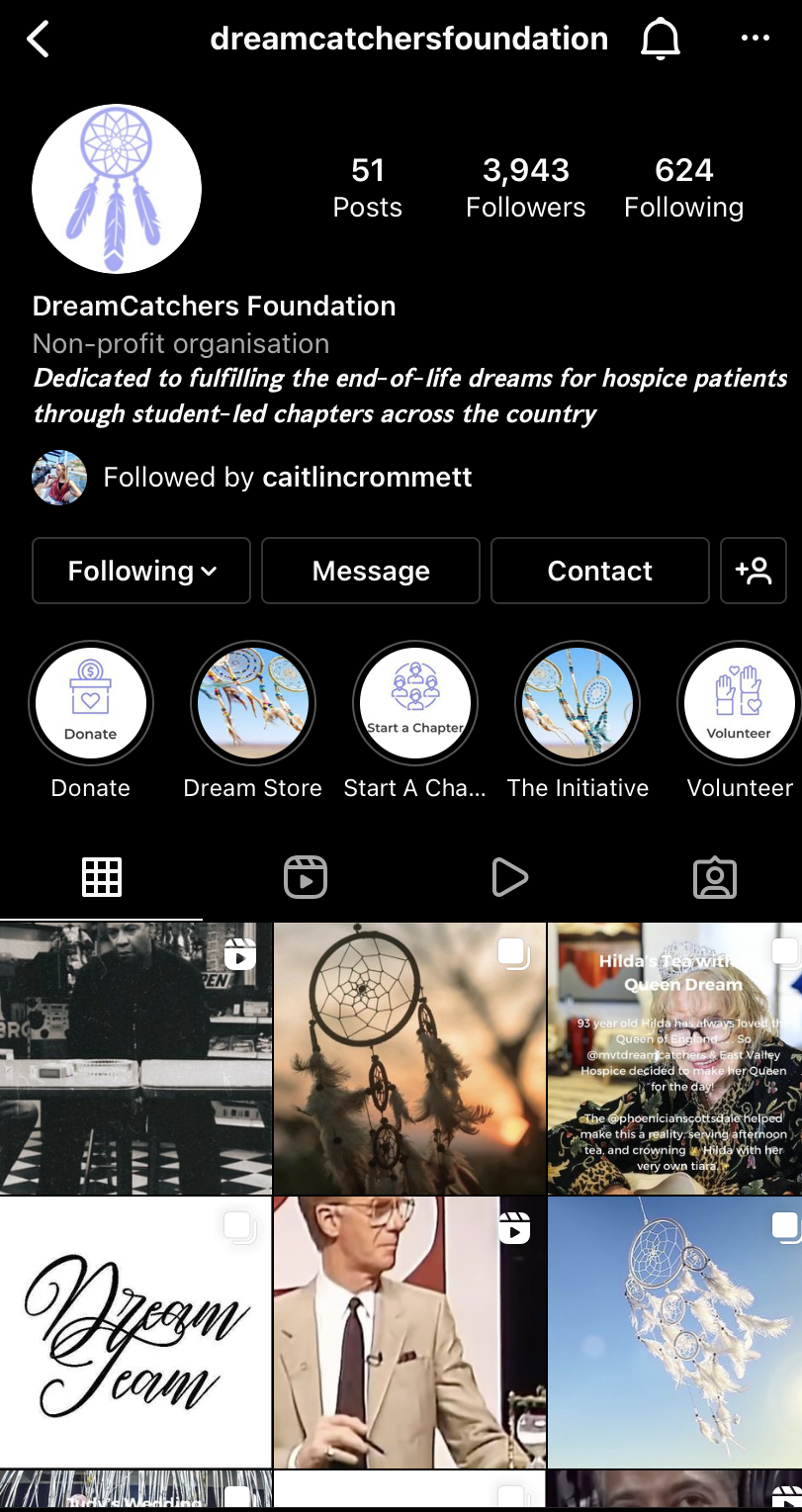
As a generational researcher with a Master's in Gerontology, Crommett is also the President of DreamCatchers Foundation- a non-profit organization aimed to bridge the gap between generations by providing an engaging platform for younger generations [high school, and college students] to work with a local hospice and fulfil the end of life dreams of their elderly terminally ill patients.
She says: “These typically elderly people in hospices will receive their dream and they'll get to connect with a younger generation who they often don't even get to interact with, because in our world, we're very age-segregated.
“I think with ageism, a lot of times people will judge based on the stereotypes that they've heard. And it's the negative stuff that really gets broadcast. You hear all these stereotypes on the news, but you don't hear the good ones.”
Clips of How 'Millennials' are portrayed by the media
Video Source: Caitlin Crommett, Generation What Academy Training Material
What generation do you belong to?
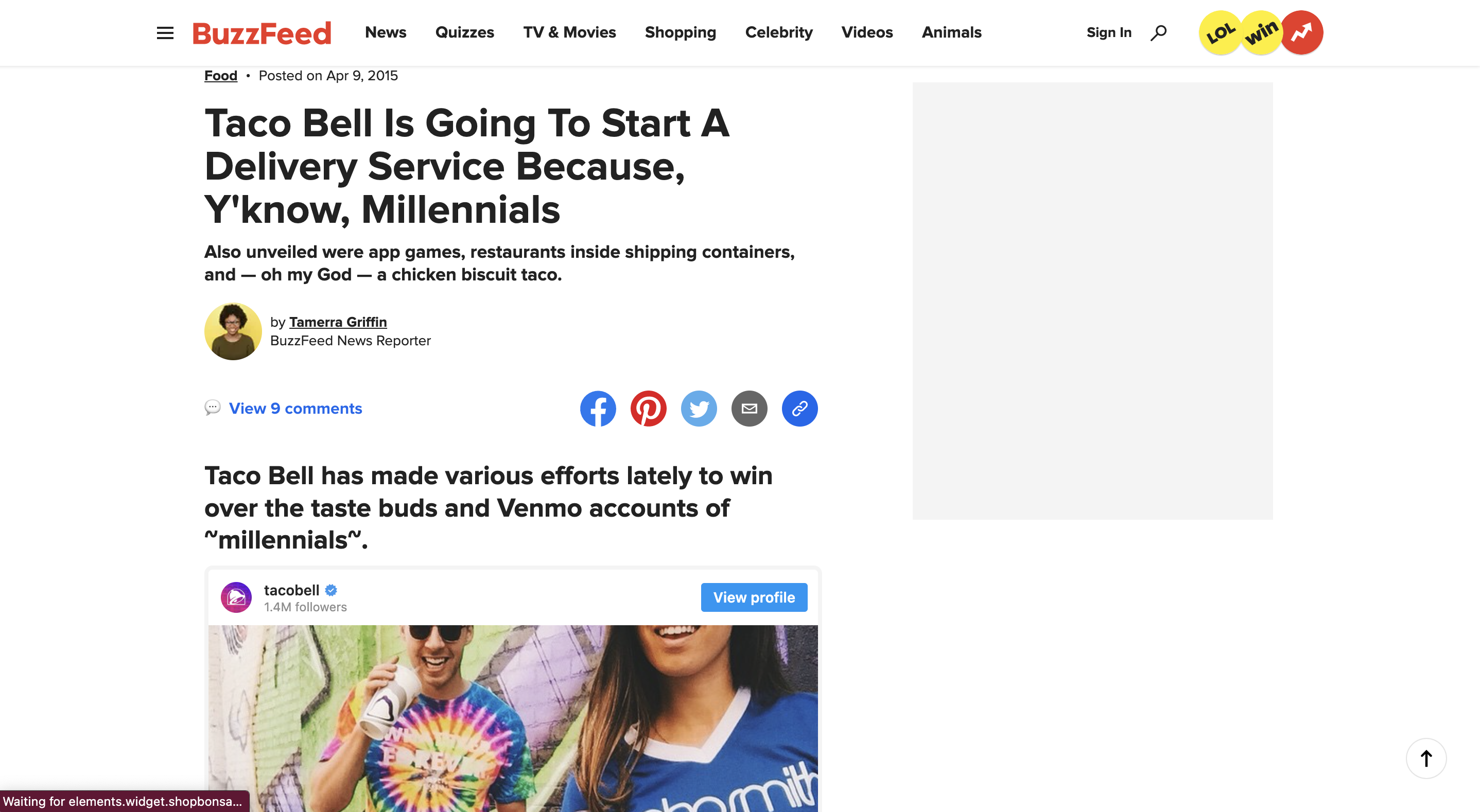
The headline for the second image changes after the extension has been added to Google Chrome. It renames 'Millenials' to 'Snake People'
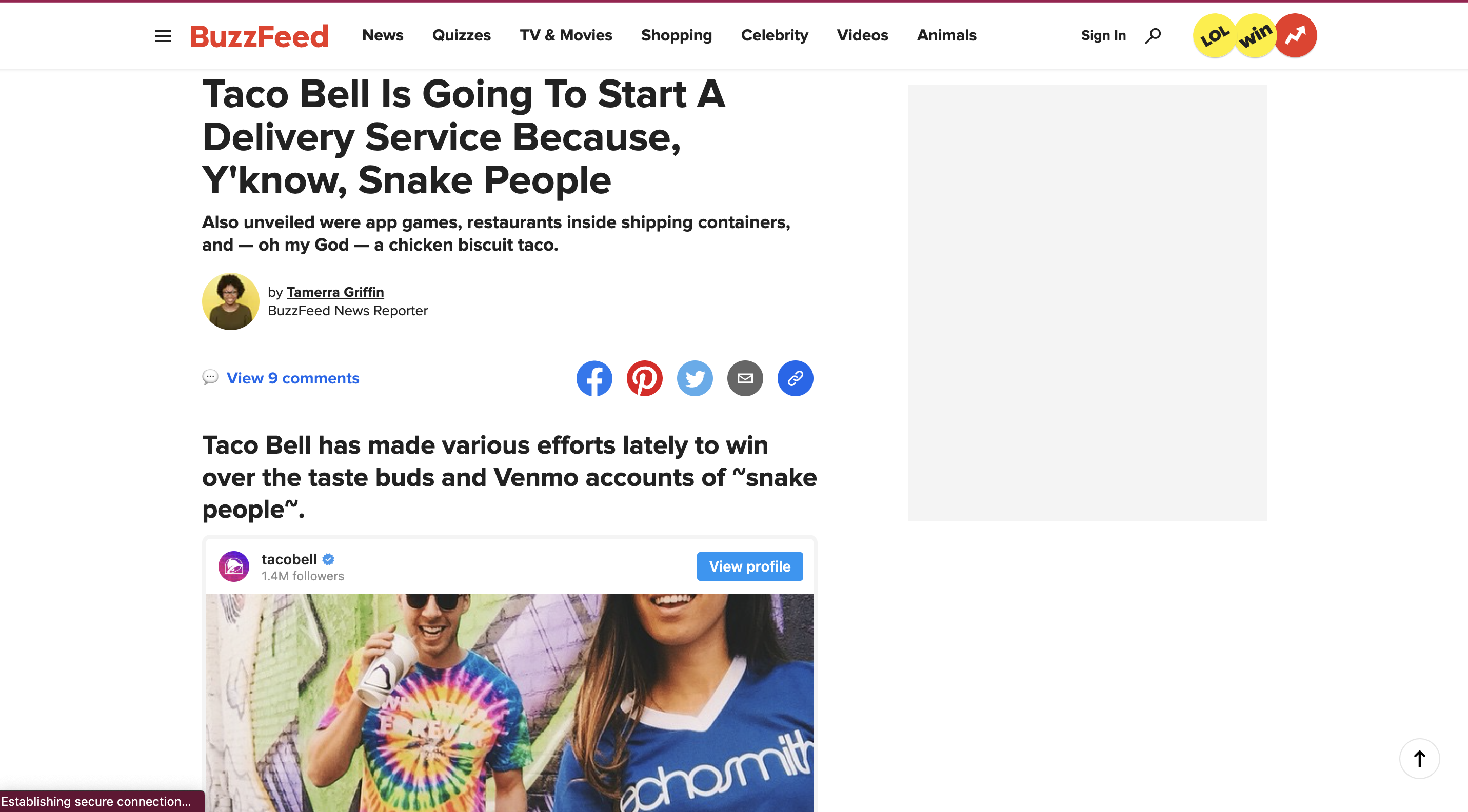
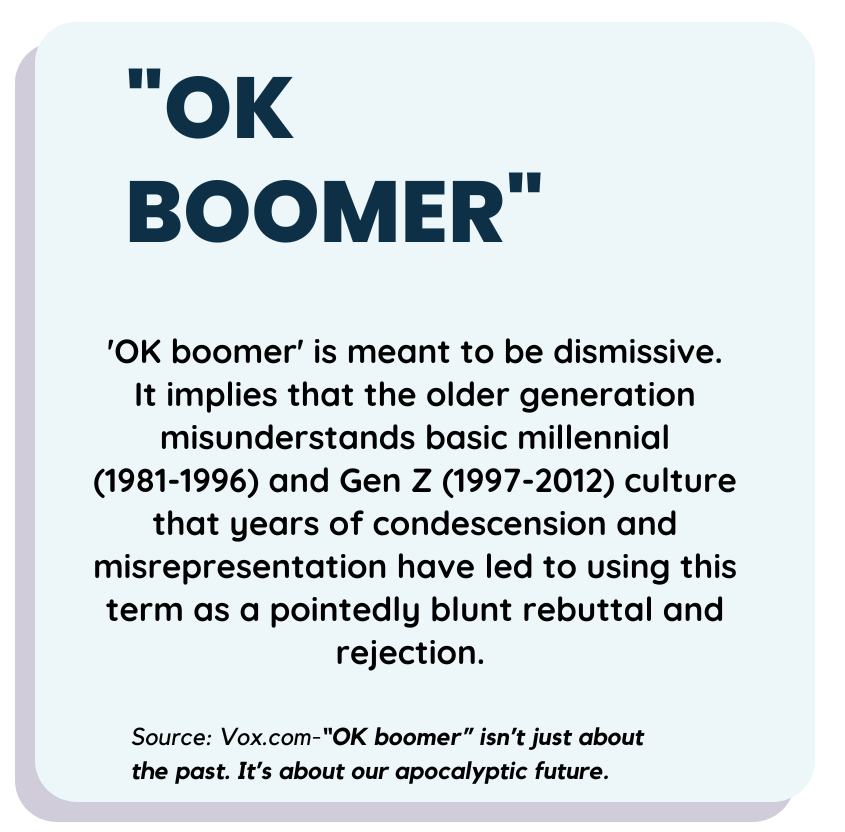
Our infatuation with these debatably superfluous terms seems to stem from our consumption of media. Popular media channels like Buzzfeed publish articles and engaging quizzes such as “I Don't Want To Make You Feel Old Or Excluded, But This Quiz Will Reveal If You're Cool By Gen Z's Standards” that are consumed by impressionable demographics.
While these are created with the goal of entertainment in mind, on some level they can imply generalising stereotypes that can create generational divides.
Google Chrome introduced an extension that was created by Eric Bailey, who was mocking the stereotype while portraying Snake People (Millennials) as tough to deal with. By activating this extension, any content with the word ‘Millenial’ changes to ‘Snake People’.
Take for example this article by Buzzfeed-Taco Bell Is Going To Start A Delivery Service Because, Y'know, Millennials "- which talks about how Taco Bell is introducing a delivery service because Millennials are ‘lazy’. With the extension, the term millennial changes to snake people.
But the point is there exists a feature that demonstrates how stereotypes are connoted to describe a generalised assumption on a generation that is viewed through popular media channels.
“I think there's a lot of that. There was the whole okay boomer phase which was such a big thing on social media, memes and BuzzFeed. Gen Z was using the phrase “okay, boomer” and basically saying, you guys don't know anything about what you've left us.
“So that was really harmful. Gen Zers were really using this phrase without knowing the background of where it came from and also the harm that it can do. Then boomers [1946–1964] are like, okay, well now we need to insult you back. “ Says Crommett on how media plays a role in generational divides.
Generations: A misunderstood concept?
The increase in the use of terms like Millennials and GenZ along with realising the importance of labels to understand demographics for marketing purposes solidifies that generational labels will always be an unavoidable concept in our lives.
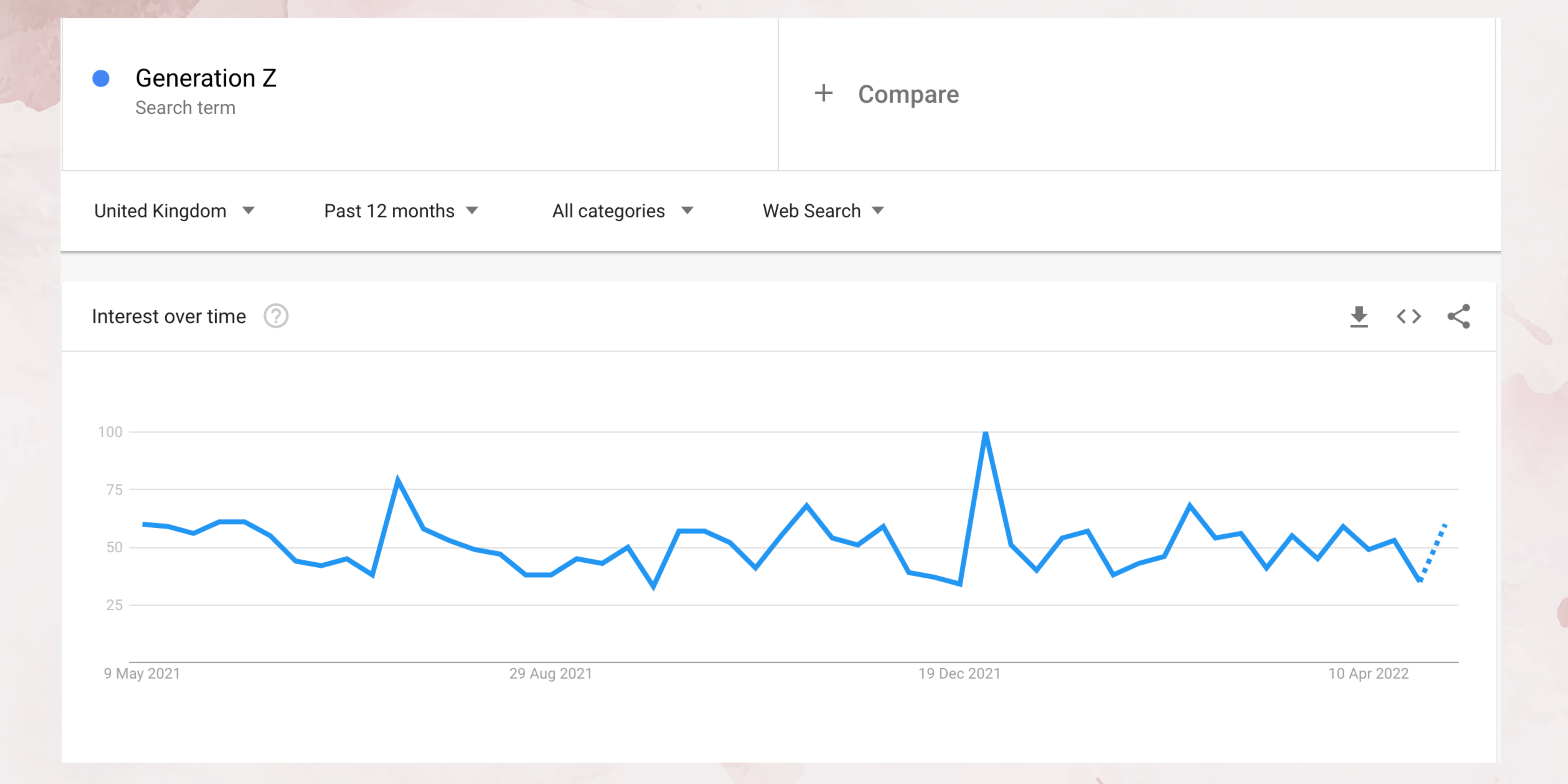
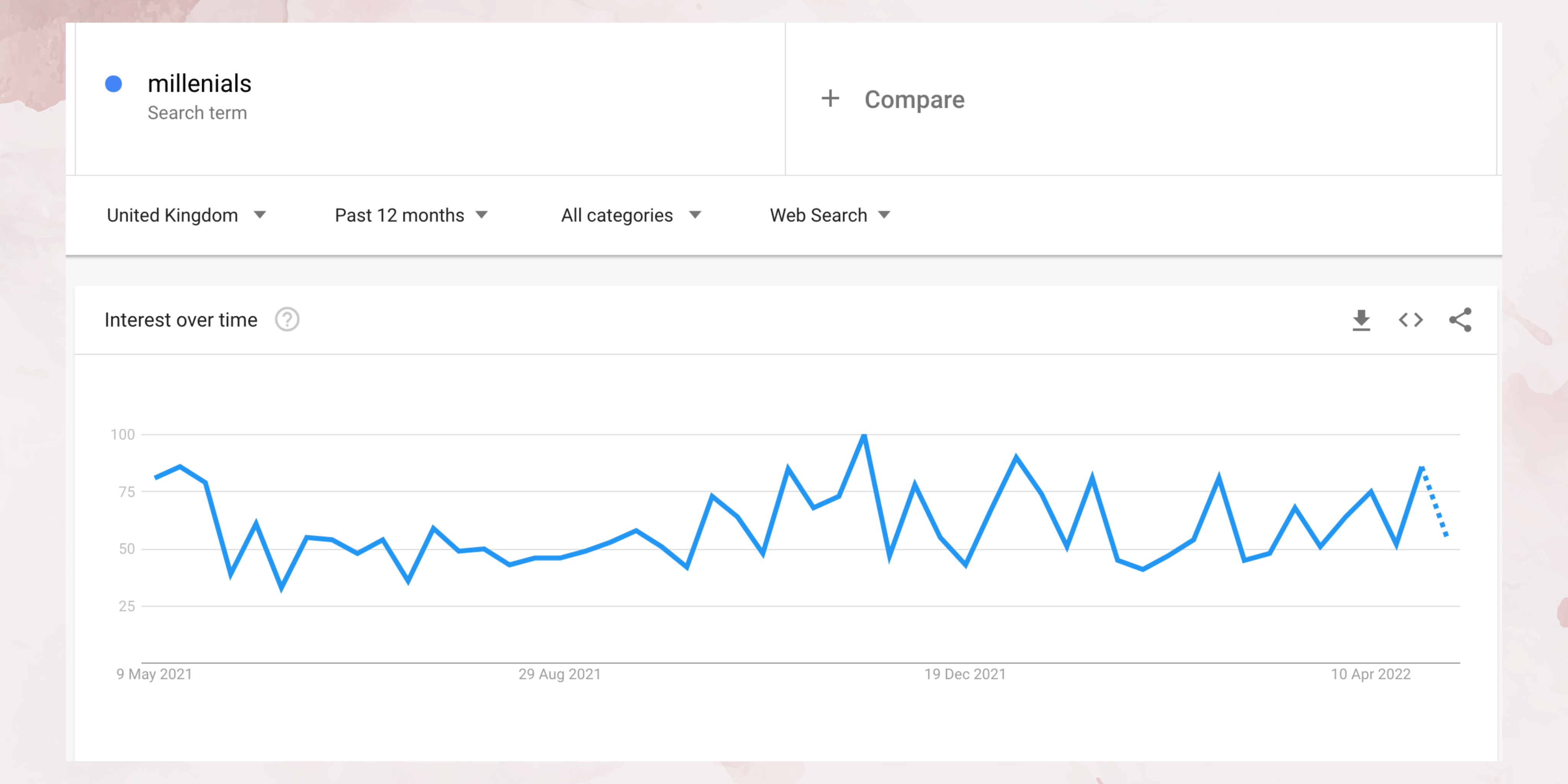
But how well do we really know what defines a generation?
A generation is a group of people born around the same time and raised around the same place. People born within this ‘birth cohort’ exhibit similar characteristics, preferences, and values over their lifetimes. Each cohort ranges between 10-15 years or more during which a significant event takes place and that’s how generations are labelled.
That being said, the Centre for Generational Kinetics- a generational research agency, stresses that although generational labels are a tool to understand lifestyle patterns over a long period of time, they are not limited to being a definitive time frame box.
“They are powerful clues showing where to begin connecting with and influencing people of different ages. There are big differences between the generations and it's important to know the years when each generation begins and ends.”- Centre for Generational Kinetic
Dr. Paul Redmond, a Generational researcher and keynote speaker with a Doctorate in Education Sociology, says: “The (generational) terms have been developed by a combination of marketers and sociologists.
"I think what's happened is people are becoming more familiar with the idea of generational labels.
“Politicians use them now. Educators use them. I think there is a growing awareness that different generations view things in different ways. And there's also a growing sense of generational inequality.”
Baby Boomers have been running the country for nearly three decades. Some successes, a number of disappointments. It’s time to pass the baton to younger generations — Millennials & Gen Z. Pls join us for conversation tonite on @CNN with @ACCooper about my new book on subject.
— David Gergen (@David_Gergen) May 10, 2022
David Gergen: Senior Political Analyst @CNN and Former adviser to 4 U.S presidents
However, with the use of these terms, there seems to be a clash between using these tools to understand differences among generations and using them as a basis to assume an individual's work ethic.
Generational expert, and author of the book ‘Generations, Inc.’ Meagan Johnson, shares: “When I talk about generational differences, beliefs and generational behaviours, my theory is that we have generational signposts.
“It's not an exact science, but really it's just a useful tool to understand some of the demographics and trends that occur with clusters of people while also looking at the shift in public attitudes.”
Here’s where the problem lies, we tend to follow generational labels Gospel, generalising and stereotyping our work patterns among different age groups and using them as reasons to justify unfair social practices predominantly in a corporate environment.
An article by Fast Company narrates the experience of a PhD student Jessica Kriegel, author of Unfairly Labeled, who says: “It’s all kind of made up. There’s not a lot of hard data that supports any of these assumptions.”
It's the same way Boomers describe Gen X, Gen X did millennials, millennials are doing now, & Gen Z will carry on with the "tradition".
— Sai Ishaya (@simon_Ishaya_) April 30, 2022
The dividing lines between generations are figments of our collective imagination.
It's now simply a tool for armchair social scientists. https://t.co/MQhdbazUfN
To an extent, monitoring generational labels have demonstrated similarities in behavioural patterns that overlap with our current experiences.
But, just like most people don’t like to be labelled when in high school, similarly, not every Baby Boomer has decided to retire.
A 2022 report by Age UK shared how poverty levels are lower than they were 20 years ago with over 2.1 million pensioners in the UK living in poverty.
Similarly, most millennials do actually value work but would rather work from home to make the most of their productivity.
According to Forbes: “Millennials want to work for companies that align with their own internal values. They focus their altruistic energies on creating a positive change.
"The ideal work-life balance for Millennials empowers them to effectively contribute to their organisation while having the resources and flexibility to care for themselves and see to their life’s demands outside of work.”
For the most part, we are aware of generational categories and the age bracket we are a part of. Some of us use these labels for data purposes or to simply understand how we’ve evolved.
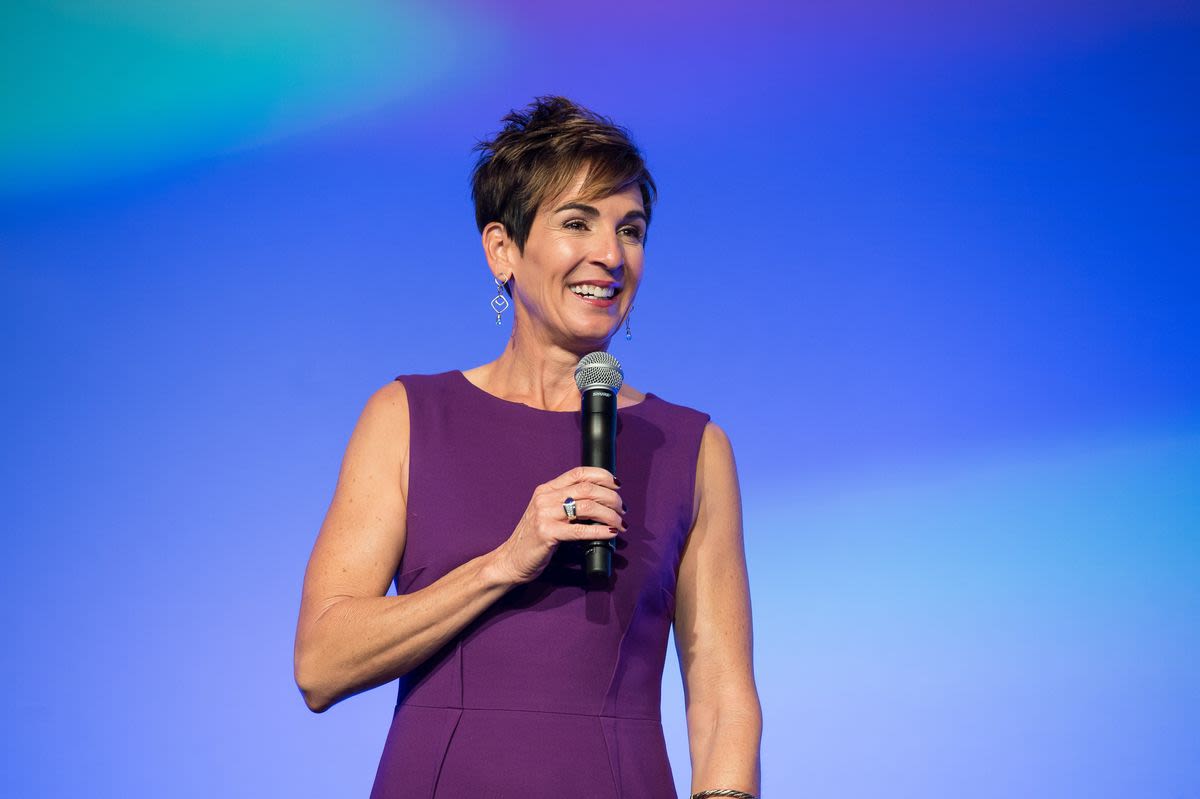
Meagan Johnson: Generational expert, speaker and author of Generations Inc.
Meagan Johnson: Generational expert, speaker and author of Generations Inc.
Meagan Johnson explains generational signposts
Meagan Johnson explains generational signposts
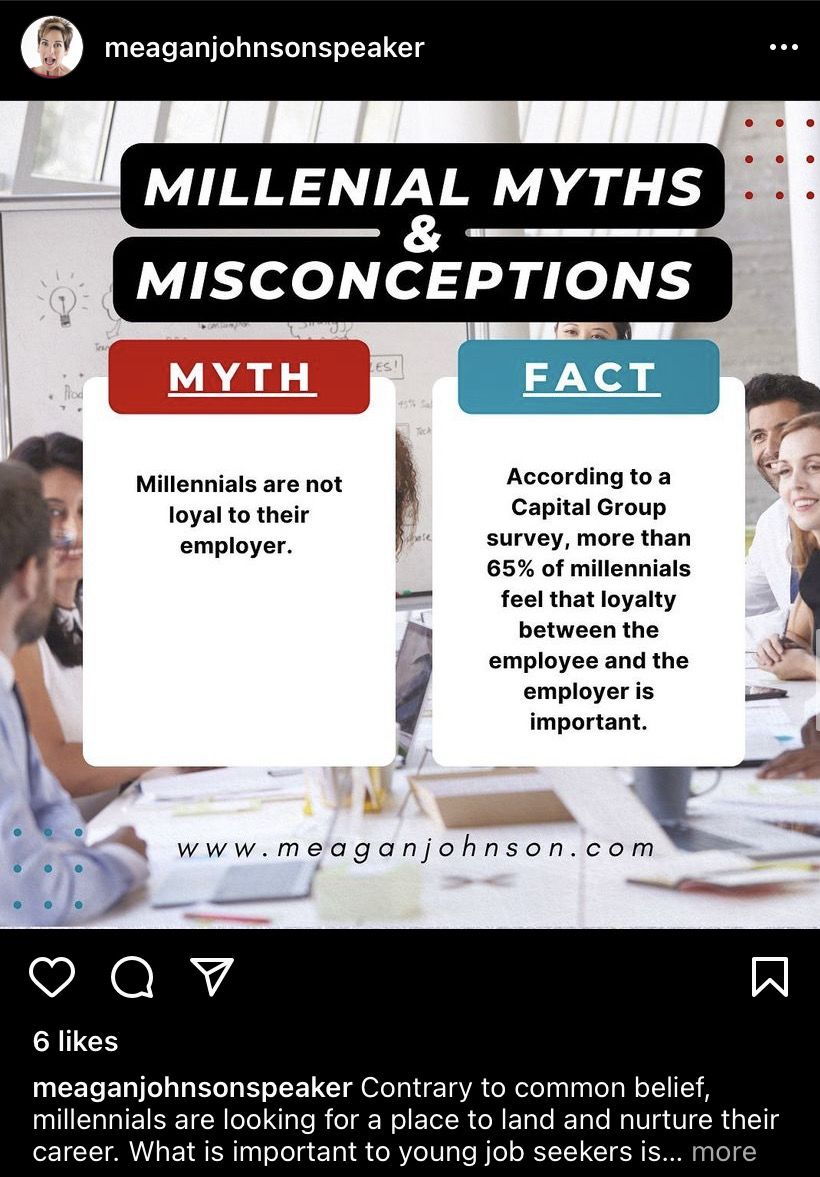
But, have generational labels created a foundation for ageist behaviour in society?
“Often a trend will begin but the younger generation will grab onto it and bring it into the cultural focus even faster." Johnson explains how younger generations evolve based on the experiences lived through older generations.
“One of the examples I use is in the 50s’ in the United States where classifieds stated help wanted ads in the newspaper that were separated by gender. They had separate ‘help wanted’ adverts for men and for women. And at that time, it was perfectly legal to list the same job in both columns with two different salaries.”
Ageist patterns in society are still ongoing practices but with a much passive-aggressive tone. For instance, Gen Xers [1965-1980] who were supposed to follow the ‘loyalty’ footsteps that Baby Boomers practised in their place of work now decide to look for job security.
Understanding the behavioural shift in how people treat their work requirements can be drawn back to the late eighties, and early nineties. During this period of the recession [from July 1990 to March 1991], Generation Xers [1965-1980] who were either in college or about to enter college and were due to graduate when they noticed a shift in job guarantees.
She adds: “This is where it always, swings back around because when the economy starts picking back up, people start to be a little bit pickier about their jobs.
“And then we saw this again with Generation Z[Centennials/ 1997–2012], with COVID-19. Lots of people got let go, especially at the time, Generation Z was at an age where they were working real entry-level jobs. Service industry jobs were the first to be let go because restaurants, bars, hotels, and all that stuff closed.
“So now, GenZ’s decided to be real choosy with where they are going to spend their time because it's up to them to develop their skills, They have to make sure they align themselves with a company that believes in what they believe and that will help them grow.”
That’s how I know Millenial and Gen Z people are going to do a better job of making younger peoples’ lives better by default because we’ve gotten absolutely torn down growing up and we aren’t going to do that to our kids and grandkids.
— MaceAhAnaheim (@MaceAhWindu) May 13, 2022
Forbes stated that: “One major way in which Gen-Z workers are distinguishing their preferences from those of other generations is with a very values-driven approach to their careers and job prospects.”
A 2021 Forrester report shared with Marketing Drive, showed that more than half (51%) of Gen Z (1997-2012) respondents will always research a company “to ensure it aligns with their position on corporate social responsibility before making a purchase.”


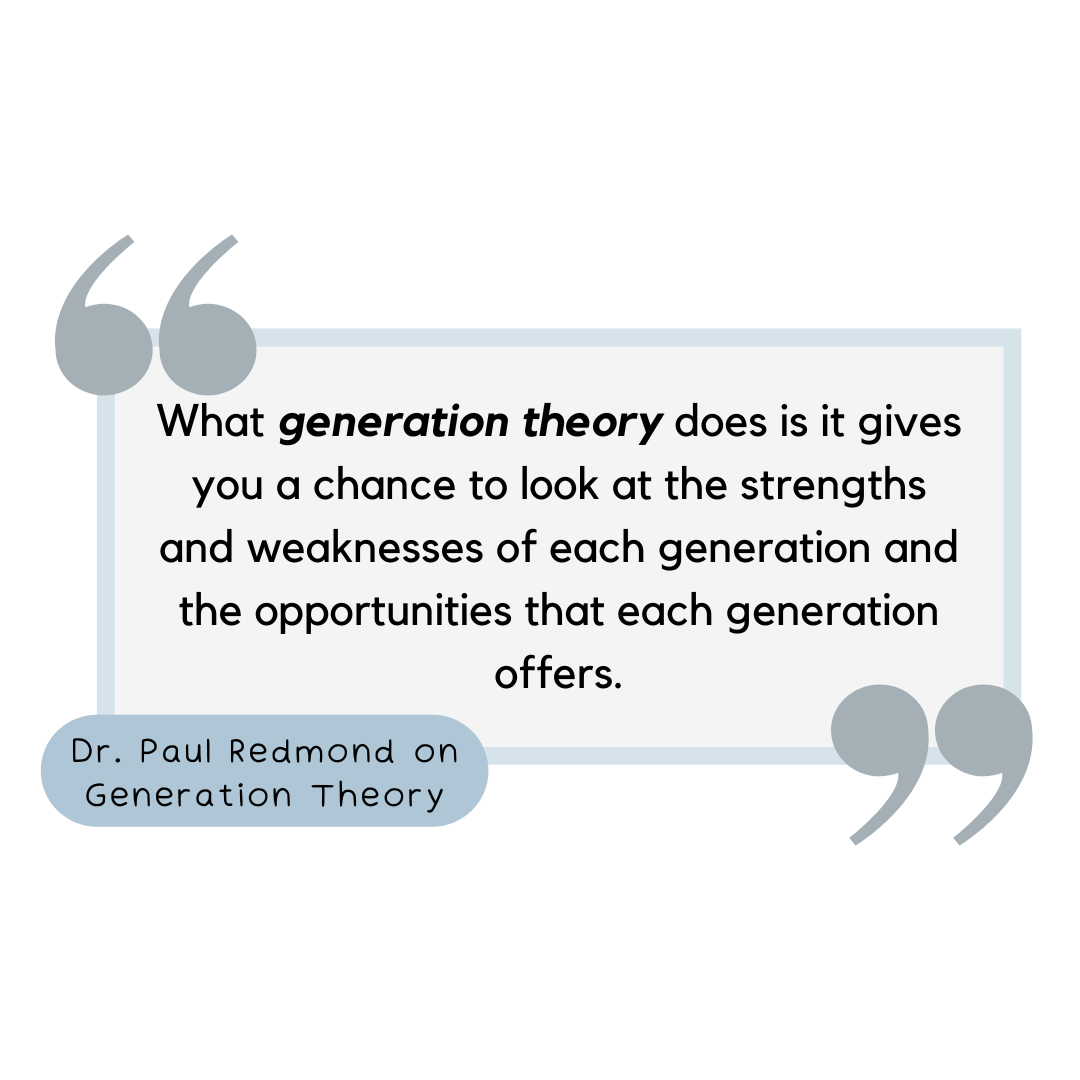
Have you ever found yourself relating to some of the similar experiences as your grandparents or parents when they narrate their childhood stories?
As each generation exhibits different characteristics and reactions to significant events in their time, we can simultaneously point out that individuals from different generations often go through a loop of encountering similar experiences during different phases of their life.
So, how is it that we find ourselves in strikingly similar experience loops despite the apparent age gaps and generational differences?
Dr.Redmond explains: "There are three things that shape our views of the world. First, there's a shared historical period that we are all going through. So everyone, no matter how old they are, the experience of COVID has shaped all our perceptions.
“The second factor is the life cycle stage that you're going through. We know that the older the people, the more conservative they get and the more risk-averse they become. All this is for good evolutionary reasons.
“But the third factor is the generation conditions that you were growing up in. Your generation outlook (Generation Z)- I found in the research- under these conditions is shaped to an extent by what's happened when growing up. It's the politics, culture, music, the technology that tends to give a generational cohort a certain perspective which you can battle against.
"You can choose and make a decision not to follow it.”
Through the growing use of these labels to distinguish ourselves from one another, we manage to blanket the inherent inequalities in society that exist between generations.
Take, for instance, having a baby boomer working in an office. If they choose not to work from home, we tend to assume that it’s because of the generation cohort that they are a part of. According to Market Watch, “a mere 3% of boomers work from home, while 62% of millennials and 35% of Generation Xers take advantage of flexible working conditions.”
"I didn't spend 40 years in an office (while taking zero responsibility for my own domestic arrangements) so you could work from home (for 50 years) (while attempting to balance all the other responsibilities I considered beneath me)"*
— Steve Jackson 💙 (@StevJacks) May 14, 2022
*Male boomer #WFH argument.
Younger generations are not the only demographics that are on the receiving end of stereotypes in the workplace.
Just as how researchers have argued that younger generations are entitled and lazy, older generations also face criticism for their ‘by the book’ work patterns.
According to a journal by Richard Posthuma and Michael Campion, on Age Stereotypes in the Workplace that was extensively researched by RTE, there are five dominant stereotypes of "older" workers such as: “ the poor performance stereotype, the resistance to change stereotype, the lower ability to learn stereotype, the shorter tenure stereotype, and the more costly stereotype.
In sum, "older" workers are stereotyped as being less economically beneficial than "younger" workers.”
"People just make negative and limiting assumptions about people just because they're older." Dr Redmond goes on to explain stereotypes among older generations and how generation theory can bridge the gap causing ageism.
"One thing I always say to companies is that older members of staff are very good at interpersonal skills, something that other generations are losing out on because of 'zombification'. So companies have those older employees train the younger employees and that has shown to be very effective.
"So there are benefits to generation theory as it gives you a chance to look at the strengths and the weaknesses of each generation rather than making these ageist assumptions."
Boomer job posting: 5 day work week, must be on site, hourly pay, cover letter required, no benefits
— 😾 (@newy0rksrealist) May 8, 2022
Gen z startup posting: 4 day work week, 6 hr work day, full benefits, 100% remote
Not even kidding I’ve experienced both of these within two weeks of intervening for jobs
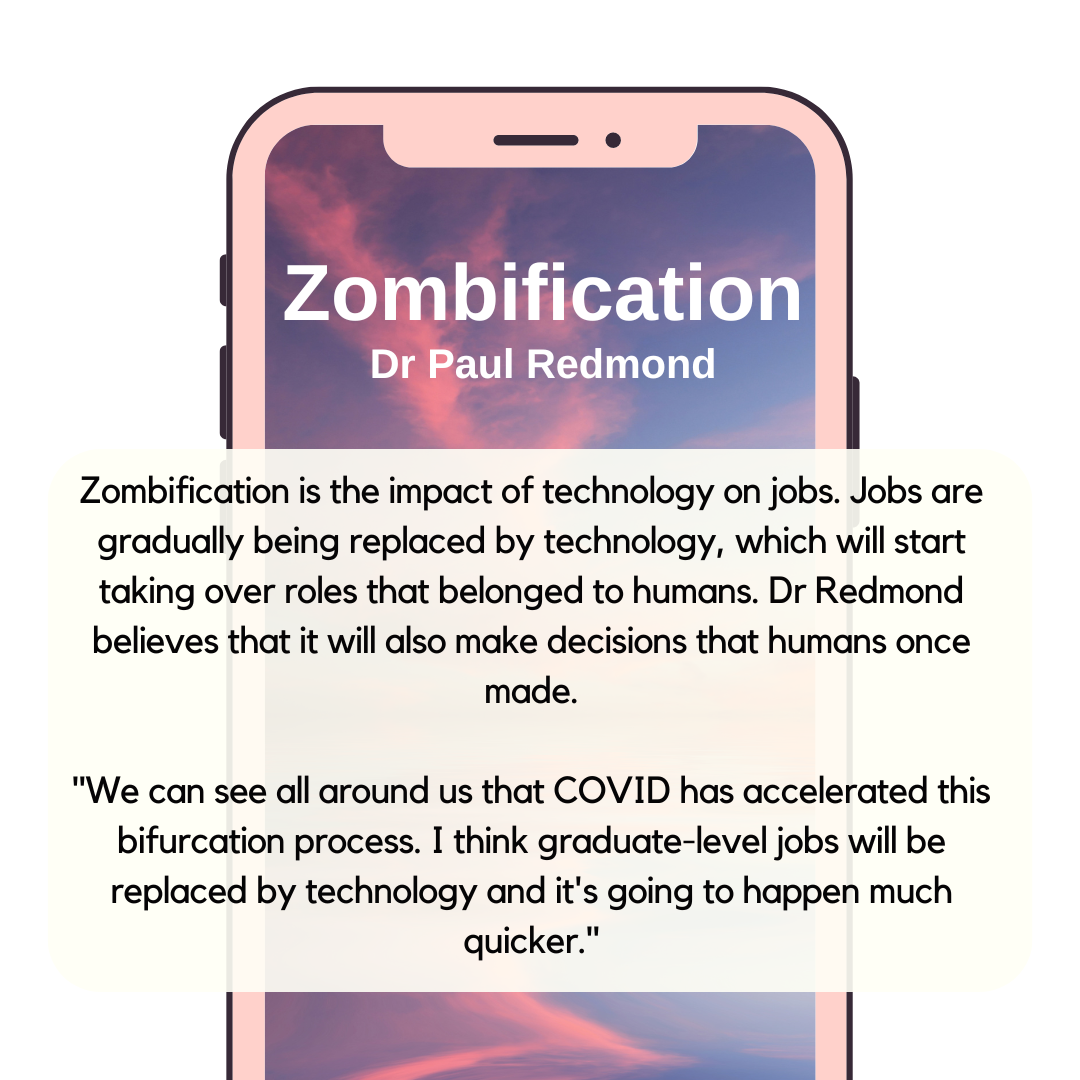
Do we need generational labels?
Reframing Aging Initiative reported the results of a survey they conducted on whether individuals identify with a particular generation label, and whether labels have value in defining themselves.
“Generation labels are just another means to denigrate a group of people with perceived similarities based on birth date.
"These labels are also being used to convey messages which are fundamentally ageist. Removing arbitrary generational labels will benefit society as a whole and advance reframing ageing efforts”

While there is going to be a persistent debate on whether or not we need generational labels as a tool to understand the different characteristics among people over the years, what we need to understand is that these labels are not the basis to assume someone’s character
Caitlin Crommett says: “There's always going to be a positive and negative side of everything. And I think the real positive side of having the labels is that we can better talk to these people, we can better understand this grouping of people.
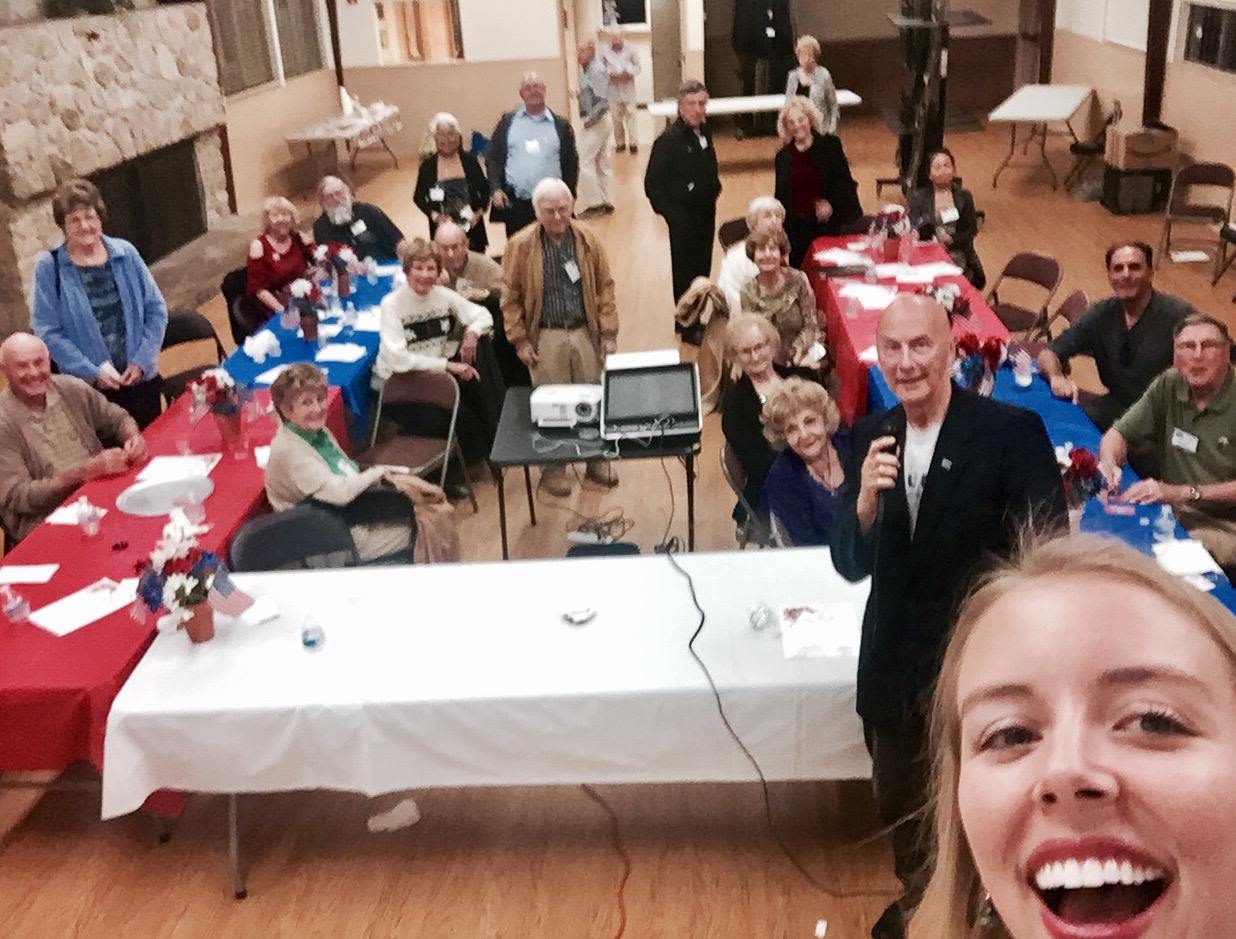
"But obviously, the negative is if you start getting into this us versus them mentality. So I think in that sense, no, we don't need to characterize people in a certain group, but how else are we going to be able to understand the world they grew up in?”